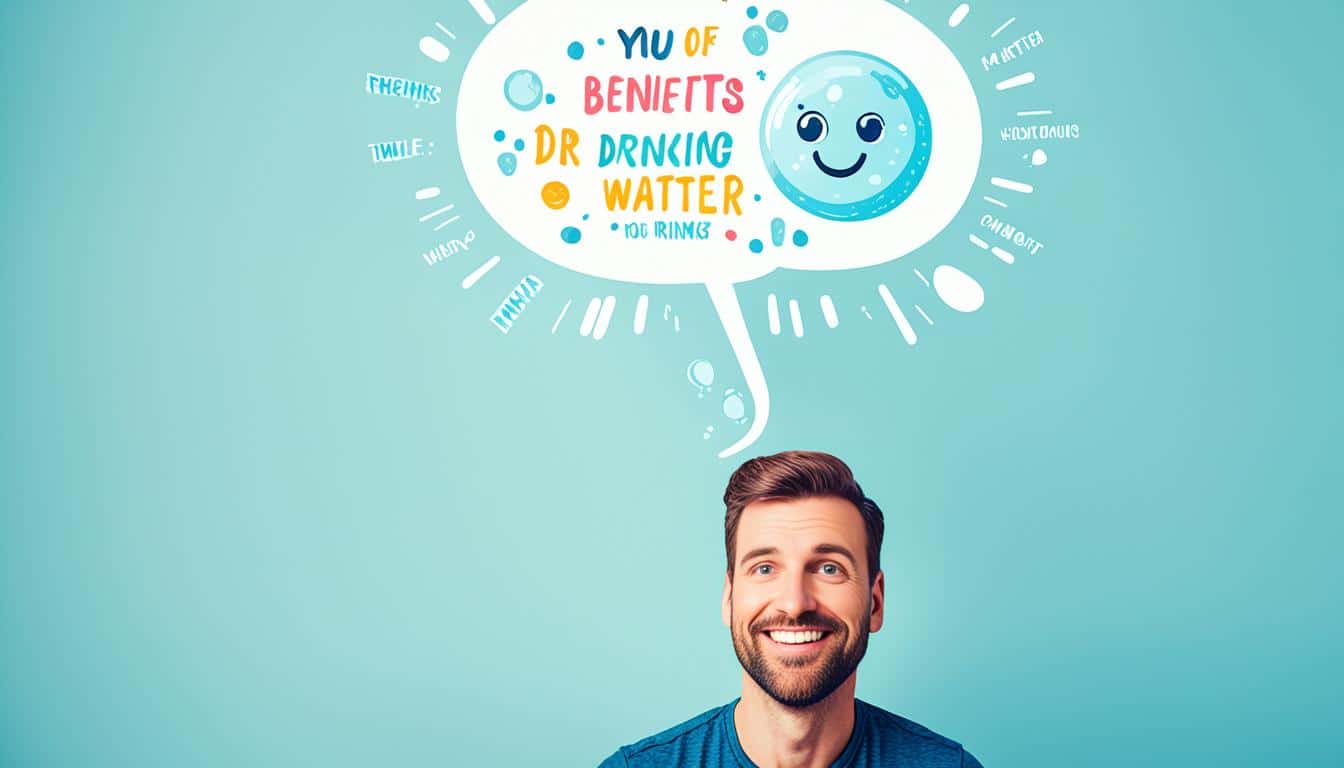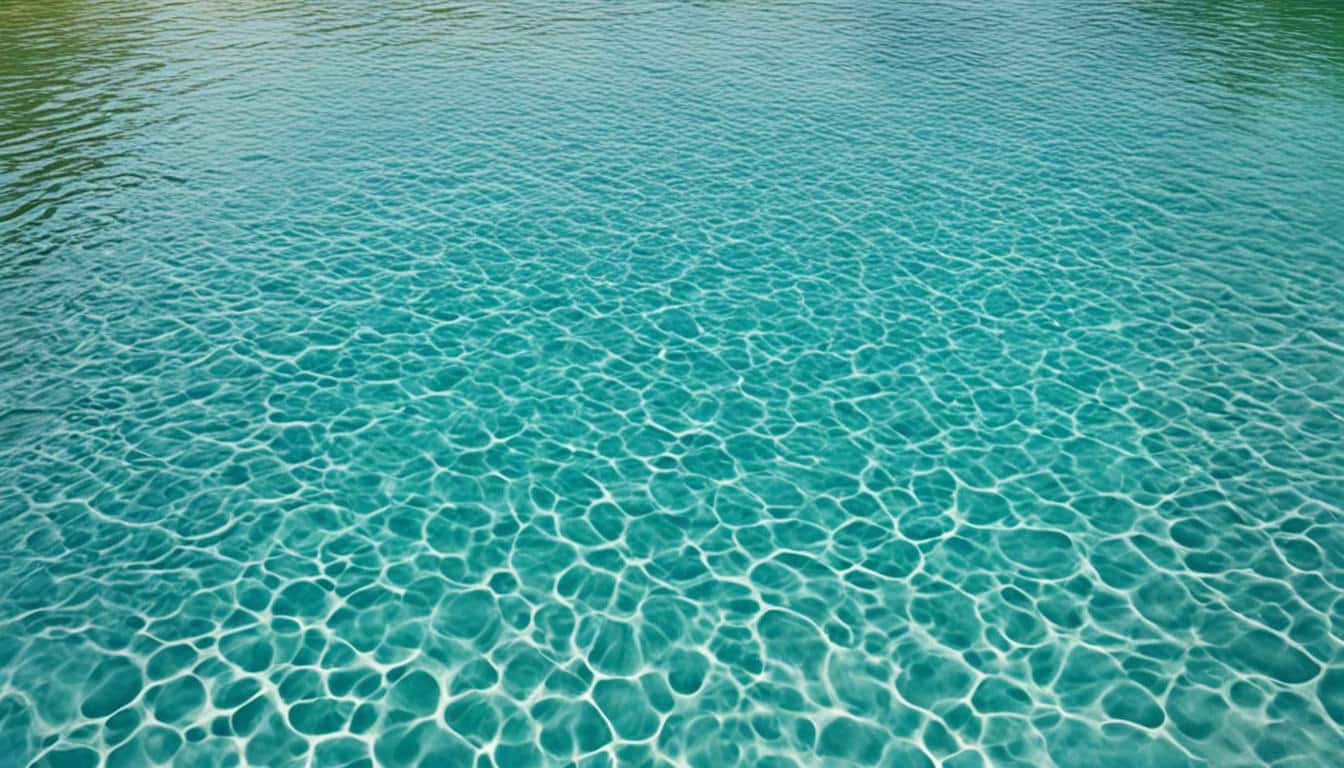Drinking Water Should Be Your Top Health Priority : Drinking water is not just a mundane task; it should be your top health priority. Water plays a vital role in maintaining overall health and well-being. Staying hydrated has numerous benefits that go beyond quenching your thirst.
Your body is composed of around 60% water, emphasizing the importance of hydration. From lubricating joints to delivering vital oxygen throughout the body, water is involved in various essential bodily functions. It also aids in preventing kidney damage and promoting healthy skin.
However, despite its crucial role, many people do not prioritize drinking enough water each day. This can lead to dehydration, which can have detrimental effects on your health and well-being.
Key Takeaways:
- Drinking enough water is essential for maintaining overall health and well-being.
- Water lubricates joints, delivers oxygen to the body, prevents kidney damage, and promotes healthy skin.
- Many people do not prioritize drinking enough water, leading to dehydration.
The Role of Water in Bodily Functions
Water is not just a thirst-quencher; it is a vital component for maintaining overall health and wellbeing. Its importance goes beyond simple hydration, as it plays a crucial role in various bodily functions and processes.
“Water is life. It is the basic building block of our bodies, and without it, our systems would not function properly.”
Hydration and Cartilage:
Proper hydration is essential for the health of our joints. Cartilage, which cushions the joints and prevents bone-on-bone contact, is made up of around 80% water. When we remain hydrated, our joints can move smoothly and without discomfort.
Saliva and Oxygen Delivery:
Water plays a crucial role in saliva production. Saliva helps break down food, aids in digestion, and keeps the mouth clean. Additionally, water helps transport essential nutrients and oxygen to different parts of the body, ensuring optimal function.
Skin Health and Body Temperature Regulation:
Hydrated skin is healthy skin. Water helps maintain the skin’s elasticity, preventing dryness, and promoting a youthful appearance. Furthermore, water is involved in regulating body temperature. It helps dissipate heat through sweat, keeping us cool and preventing overheating.
Brain Function and Waste Removal:
The brain relies on proper hydration to function optimally. Water cushions the brain and spinal cord, protecting them from injury. It also aids in the removal of waste products through urine and sweat, helping to detoxify the body.
Proper Blood Pressure and Digestion:
Staying hydrated helps maintain proper blood pressure levels, reducing the risk of hypertension and cardiovascular diseases. Adequate water intake also supports digestion, preventing constipation and promoting regular bowel movements.
Overall, water is an essential element for the proper functioning of our bodies. Dehydration can lead to a range of health issues, including joint pain, skin disorders, impaired brain function, and digestive problems. By prioritizing hydration and drinking enough water throughout the day, we can support our overall health and wellbeing.
The Impact of Water on Kidney Health

Adequate water intake is crucial for maintaining kidney health. The kidneys play a vital role in regulating fluid balance in the body, ensuring that waste products are eliminated through urine. Dehydration can significantly impact kidney function and increase the risk of various kidney-related conditions.
One common condition associated with inadequate water intake is kidney stones. These are hard deposits that form in the kidneys when there is a build-up of certain substances. Dehydration concentrates the urine, making it more likely for these substances to crystallize and form stones. Drinking plenty of water helps dilute the urine and reduces the risk of kidney stones.
“Kidney stones affect approximately 12% of men and 7% of women in the United States.”
In addition to kidney stones, dehydration can also lead to urinary tract infections (UTIs). When the body lacks sufficient water, it affects the urinary system’s ability to flush out bacteria and other harmful substances. This increases the likelihood of UTIs, which can cause discomfort, pain, and potentially lead to more severe complications if not promptly treated.
Furthermore, chronic dehydration can contribute to kidney failure, a serious condition where the kidneys lose their ability to filter waste products from the blood. This can result in the accumulation of toxins and excess fluids in the body, leading to various complications and potentially life-threatening consequences.
The Role of Water in Supporting Kidney Function
Drinking an adequate amount of water is crucial for supporting proper kidney function. Water helps the kidneys filter waste products and toxins from the blood, ensuring they are eliminated through urine. Sufficient water intake also helps maintain optimal blood flow to the kidneys, promoting their overall health.
In addition to supporting kidney function, staying hydrated plays an essential role in preventing dehydration-induced complications. When the body is adequately hydrated, the urine is light in color and more diluted. This indicates that the kidneys are effectively flushing out waste products and maintaining optimal fluid balance.
Water Intake Guidelines for Kidney Health
While individual needs may vary, there are general water intake guidelines that can help promote kidney health. The National Academies of Sciences, Engineering, and Medicine recommends a daily water intake of approximately 3.7 liters (125 ounces) for men and 2.7 liters (91 ounces) for women through various beverages, including water.
It’s important to note that water intake should be adjusted based on factors such as physical activity level, climate, and overall health. For example, individuals living in hotter climates or engaging in intense physical activity may need to increase their water intake to compensate for fluid loss through sweating.
Pro Tip: To ensure you stay adequately hydrated, keep a reusable water bottle with you throughout the day and aim to drink water regularly. Setting reminders or incorporating water breaks into your routine can also help.
| Age Group | Recommended Daily Water Intake |
|---|---|
| Adult Men | 3.7 liters (125 ounces) |
| Adult Women | 2.7 liters (91 ounces) |
| Children (4-8 years) | 1.7 liters (57 ounces) |
| Adolescents (9-13 years) | 2.4-2.7 liters (81-91 ounces) |
Water and Disease Prevention
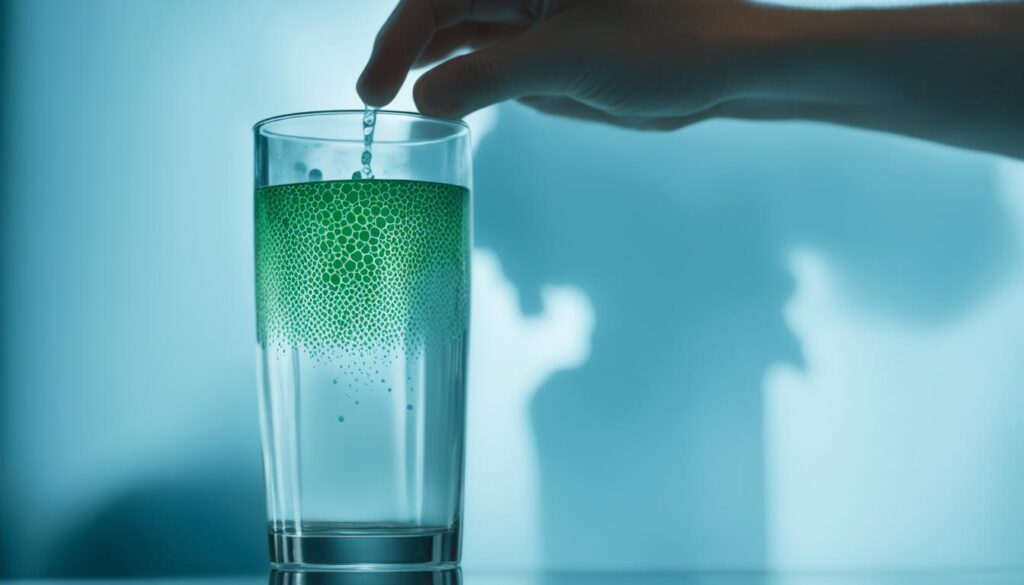
Safeguarding access to clean and uncontaminated water is vital for disease prevention. Microbiologically contaminated drinking water can transmit various waterborne diseases, including diarrhoea, cholera, dysentery, typhoid, and polio. These diseases can spread rapidly in areas with inadequate water supply and poor sanitation.
Proper preventive measures, such as ensuring access to safe and sufficient water, coupled with practicing good hand hygiene, play a crucial role in minimizing the risk of waterborne illnesses. Drinking clean water and maintaining hand hygiene are effective strategies to significantly reduce the transmission of waterborne diseases.
Hand hygiene is particularly essential in preventing waterborne diseases. According to the World Health Organization (WHO), washing hands with soap and water for at least 20 seconds is a simple yet powerful preventive measure that can help prevent the spread of diarrhoeal diseases caused by contaminated water.
By prioritizing access to safe drinking water and adopting proper preventive measures like hand hygiene, individuals can protect themselves and their communities from the devastating impact of waterborne diseases.
Preventive Measures for Waterborne Diseases
Here are some preventive measures that can be taken to reduce the risk of waterborne diseases:
- Drink clean and treated water from reliable sources.
- Ensure proper sanitation facilities and waste management systems.
- Practice good hand hygiene, including washing hands with soap and water.
- Boil or treat water before consumption, especially in areas with unreliable water sources.
- Avoid consuming raw or undercooked food, especially in areas with inadequate hygiene standards.
- Immunize against diseases like cholera and polio, where vaccines are available.
By following these preventive measures and promoting access to safe water, communities can significantly reduce the incidence of waterborne diseases and improve public health.
The Connection Between Water and Weight Loss
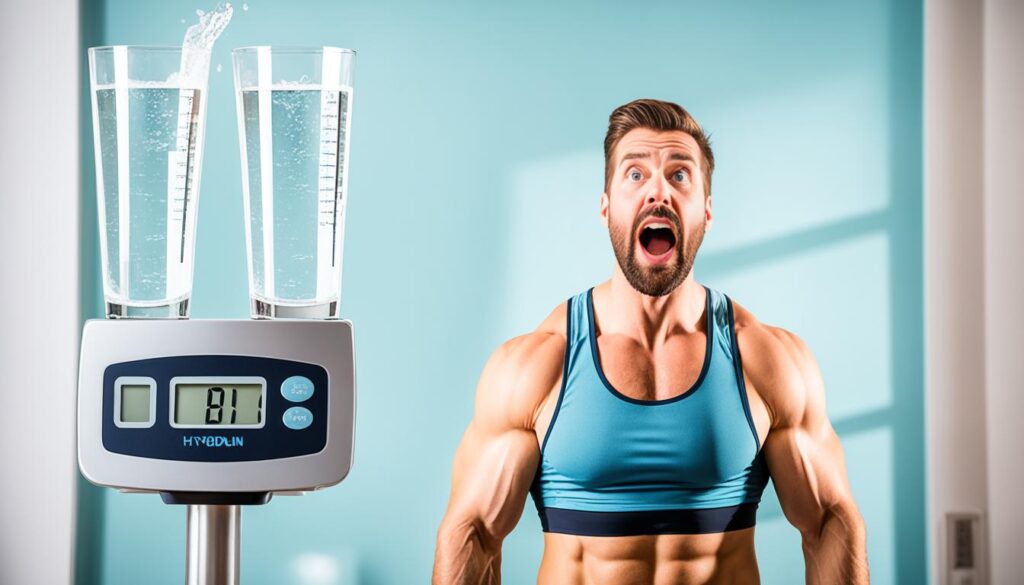
Water can play a significant role in weight loss efforts. Not only is water a calorie-free beverage, but it also has additional properties that can support your weight loss journey.
When it comes to weight management, hydration is key. Drinking an adequate amount of water throughout the day helps maintain a healthy metabolism. Staying hydrated allows your body to efficiently break down food and convert it into energy, which can aid in weight loss.
Additionally, water can act as a hunger suppressant. Sometimes, our brains mistake thirst for hunger, leading to unnecessary snacking or overeating. By drinking water before meals, you can create a sense of fullness, helping to control your appetite and prevent overindulgence.
Replacing sugary beverages with water can also contribute to weight loss. Sugary drinks are often high in calories and provide little nutritional value. By opting for water instead, you eliminate the calorie intake associated with these beverages, making it easier to create a calorie deficit and achieve your weight loss goals.
Incorporating water into a balanced diet and exercise routine is essential for successful weight loss. Remember to drink water regularly throughout the day, especially during workouts, to stay hydrated and support your body’s natural fat-burning processes.
To summarize, drinking water can aid in weight loss by promoting hydration and supporting a healthy metabolism. It also acts as a calorie-free beverage and a natural hunger suppressant. By prioritizing water consumption and making it a staple in your weight loss journey, you can increase your chances of achieving your desired results.
| Benefits of Water in Weight Loss | How to Incorporate Water into Your Weight Loss Journey |
|---|---|
|
|
Water as a Cost-effective and Healthy Beverage Choice
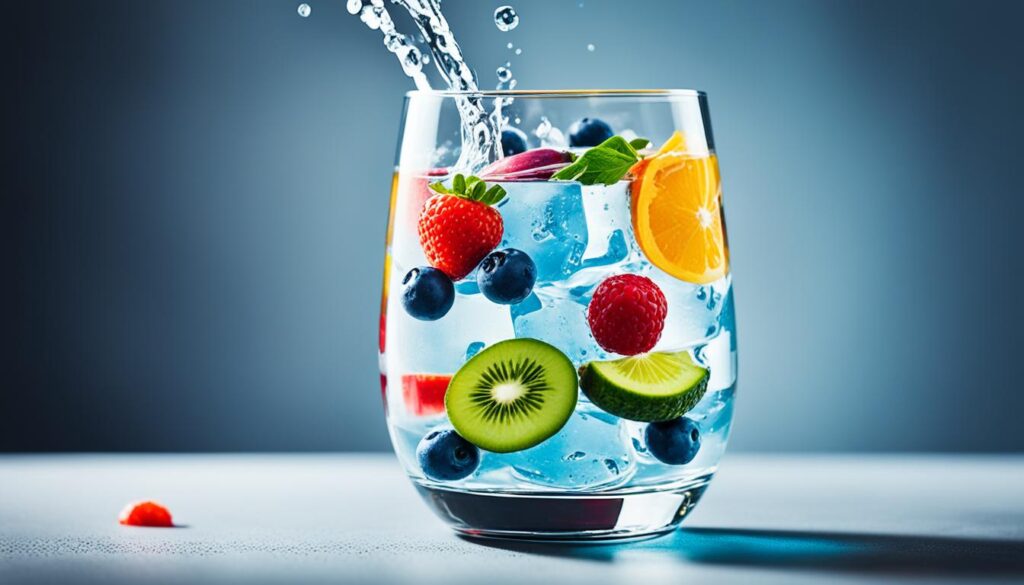
Choosing water as the primary beverage can have significant cost-saving advantages while promoting hydration and overall health. Many alternatives, such as sodas and juices, not only come with a higher price tag but can also contribute to weight gain and other health issues.
By opting for water, individuals can enjoy the following health benefits:
- Hydration and Productivity: Staying properly hydrated throughout the day is essential for maintaining optimal productivity and focus. Water helps regulate body temperature, supports brain function, and keeps energy levels high, avoiding the midday slump.
- Health Benefits of Water: Drinking adequate amounts of water can improve digestion, enhance skin health, and aid in weight management. It also helps flush out toxins from the body, boosts the immune system, and promotes overall well-being.
- Savings from Choosing Water: Switching from sugary beverages to water can result in significant financial savings. The cost of soft drinks, energy drinks, and bottled juices can quickly add up. By choosing water, individuals can reduce their beverage expenses and allocate the saved money towards other essential needs or desires.
Making the switch to water doesn’t mean sacrificing taste or convenience. Carrying a reusable water bottle allows for easy access to hydration while being cost-effective and environmentally friendly. Additionally, opting for tap water or investing in a quality water filtration system can provide safe and great-tasting water at a fraction of the cost of bottled alternatives.
Choosing water over sugary drinks is not only a smart financial decision but also a healthier choice for the body and mind. Incorporating water as the go-to beverage can lead to long-term cost savings, improved hydration, and enhanced overall well-being.
Recommended Daily Water Intake
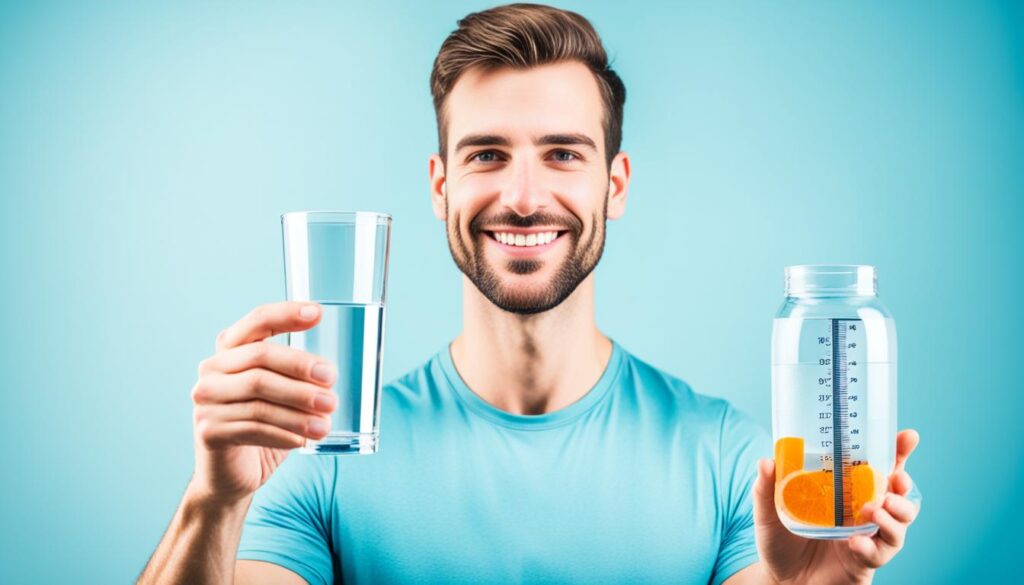
When it comes to daily water intake, the amount can vary based on several factors, including age, sex, activity level, and climate. It’s important to understand the guidelines to ensure you’re staying properly hydrated.
On average, it’s recommended that men aim for around 3.7 liters or 125 ounces of water per day, while women should aim for around 2.7 liters or 91 ounces. However, it’s crucial to note that these are general guidelines and individual needs may vary.
Approximately 80% of the recommended daily intake should come from beverages, such as water, while the remaining 20% can be obtained through food. It’s essential to prioritize water consumption, as it provides numerous health benefits and aids in hydration.
Factors such as physical activity, climate conditions, and overall health can influence your water needs. For example, if you engage in intense workouts or live in hot, humid environments, you may need to increase your water intake to compensate for the additional fluid loss through sweat.
Remember to listen to your body and adjust your water intake accordingly. It’s always better to err on the side of caution and ensure you’re adequately hydrated.
Benefits of Proper Hydration
- Optimal bodily function
- Improved concentration and cognitive function
- Skin health and complexion
- Supports digestion and nutrient absorption
- Boosts energy levels and reduces fatigue
Dangers of Dehydration
- Headaches and dizziness
- Decreased cognitive performance
- Risk of kidney stones
- Impaired physical performance
- Dry skin and reduced elasticity
Tips for Meeting Daily Water Intake
- Carry a reusable water bottle with you
- Set reminders to drink water throughout the day
- Infuse water with fruits or herbs for added flavor
- Include hydrating foods in your diet, such as watermelon and cucumbers
- Avoid excessive caffeine and alcohol consumption, as they can dehydrate you
Summary
Meeting the recommended daily water intake is essential for maintaining overall health and well-being. By understanding the guidelines and considering individual factors, you can ensure proper hydration and enjoy the numerous benefits that come with it.
Global Water Access and Challenges
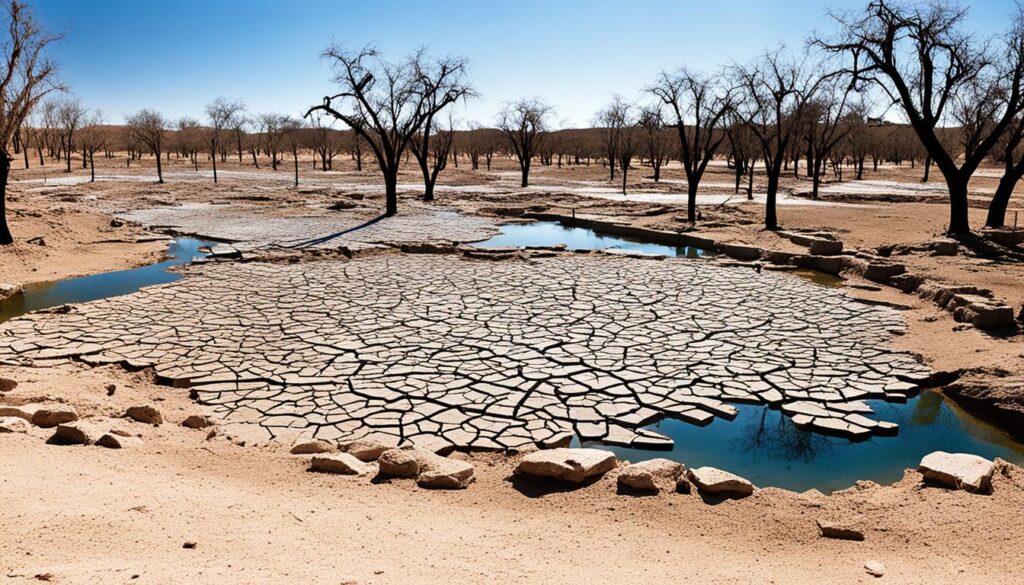
In 2021, over 2 billion people live in water-stressed countries, and this number is expected to increase due to the combined effects of climate change and population growth. This poses significant challenges for ensuring access to safe drinking water in many parts of the world. The scarcity of water resources and contamination of water sources further exacerbate the problem.
Around the globe, at least 1.7 billion people rely on drinking water sources that are contaminated with faeces, posing serious health risks. Access to safe drinking water remains a pressing issue, particularly in low-income areas and underserved communities. Lack of proper sanitation facilities and infrastructure further compound the problem, contributing to the spread of waterborne diseases.
Sustainable management of water resources is crucial for addressing water scarcity and ensuring access to safe drinking water for all. This involves implementing efficient water conservation practices, promoting responsible water usage, and investing in water infrastructure development. Additionally, improving sanitation systems and raising awareness about the importance of clean water and hygiene practices are vital components of addressing the challenges associated with global water access.
We must prioritize the need for long-term solutions to combat water scarcity and safeguard access to safe drinking water for communities worldwide. Only through concerted efforts and strategic interventions can we ensure the availability of this essential resource for generations to come.
Conclusion
Drinking water is not just a matter of quenching your thirst – it should be a top health priority. The importance of hydration cannot be overstated, as it plays a crucial role in maintaining overall health and well-being. By prioritizing adequate water intake, you can support bodily functions, prevent diseases, and even promote weight loss.
Adequate water intake is particularly essential for kidney health. The kidneys rely on sufficient hydration to regulate fluid balance in the body, and dehydration can lead to the formation of kidney stones, urinary tract infections, and even kidney failure. By ensuring you drink enough water, you can help keep your kidneys healthy and functioning optimally.
In addition to supporting kidney health, drinking water is a preventive measure against diseases. Access to clean and safe drinking water is crucial, as contaminated water sources can transmit waterborne illnesses such as diarrhea, cholera, dysentery, typhoid, and polio. By choosing water as your primary beverage and practicing good hygiene, you can significantly reduce the risk of these diseases and safeguard your health.
By making water your go-to beverage, you not only prioritize your health but also save money. Water is a cost-effective choice compared to sugary drinks, which can contribute to weight gain and other health issues. By carrying a reusable water bottle and opting for tap or filtered water, you can reduce beverage expenses while promoting hydration and overall well-being. Remember, following recommended daily water intake guidelines and ensuring access to safe drinking water are vital for optimal health.
Also Refer : Discover Funny Yoga Poses For A Good Laugh
FAQs
Q: Why should drinking water be your top health priority?
A: Drinking water is a top priority for staying healthy as it helps in good hydration, benefits of drinking water, and ensures you stay hydrated throughout the day.
Q: What are the benefits of drinking water?
A: Drinking water offers numerous benefits such as aiding in digestion, regulating body temperature, flushing out toxins, promoting clear skin, and boosting energy levels.
Q: How much water should I drink daily to stay hydrated?
A: It is recommended to drink at least 8-10 glasses of plain water each day to maintain good hydration levels and stay healthy.
Q: Why is staying hydrated important for overall well-being?
A: Proper hydration plays a crucial role in maintaining bodily functions, supporting organ health, improving cognitive function, and enhancing athletic performance.
Q: What happens if I don’t drink enough water?
A: Lack of water intake can lead to dehydration, which may cause fatigue, headaches, dry skin, muscle cramps, and impair your overall health.
Q: How can I ensure I have access to clean drinking water?
A: To ensure access to clean drinking water, you can use water filters, drink from safe water sources, or invest in water purification systems for your home.
Q: What are the signs that indicate I need to drink more water?
A: Signs that indicate you need to drink more water include dark urine, dry mouth, feeling thirsty, headaches, and experiencing fatigue or dizziness.
Q: How does drinking more water impact weight loss and overall well-being?
A: Drinking more water can aid in weight loss by promoting a feeling of fullness, boosting metabolism, flushing out toxins, and supporting proper digestion, leading to improved overall well-being.









